Every year, the German Drama Group at the University of Aberdeen works with one of our GETs to bring a German play to the stage. Recent performances included Dürrenmatt, Borchert and Horvárt. Please see below for recent productions.
Fast Faust, March 2022
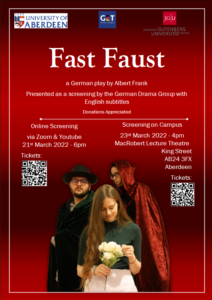 German Theatre at the University of Aberdeen
German Theatre at the University of Aberdeen
As part of the long-standing partnership between the Johannes Gutenberg Universität Mainz and the University of Aberdeen, the UoA’s German Drama Group under the direction of JGU’s Lisa von Gartzen put on a refreshingly funny, abbreviated version of Goethe’s well-known masterpiece Faust. Two performances, a virtual stream and an in-person screening at the MacRobert Lecture Theatre, allowed an audience from all over the world to see the group’s take on the play fast Faust by Albert Frank, which is itself a modern take on Goethe’s famous play. The German performance with English subtitles was an opportunity to experience Goethe’s remarkable use of language in German, while keeping the play understandable and accessible to everyone.
In fast Faust, Debora Poštulková, Lucy Stenhouse and Cem Zor play the roles of three actors who are struggling to perform Goethe’s Faust. Budget cuts and Covid cases in their company have forced them to adapt the play with 57 parts in a way that allows the three of them to perform it on their own, on a minimalistic stage and without fancy props or costume changes. This results in a heavily abbreviated version of Faust that relies heavily on suspension of disbelief, as well as attention to detail and some great comic timing.
And yet, within this funny and entertaining performance, the reflection of the original Faust’s storylines in the three actor’s struggles makes for a nuanced exploration of not only the plot, but also the themes of Goethe’s renowned classic. Anyone in the audience who did not know Faust before, can now give a confident synopsis of the play, including some readings of famous scenes. At the same time, even those who already knew the play by heart can still say they learned something about the inner workings of theatre – and, of course, everyone enjoyed the experience.
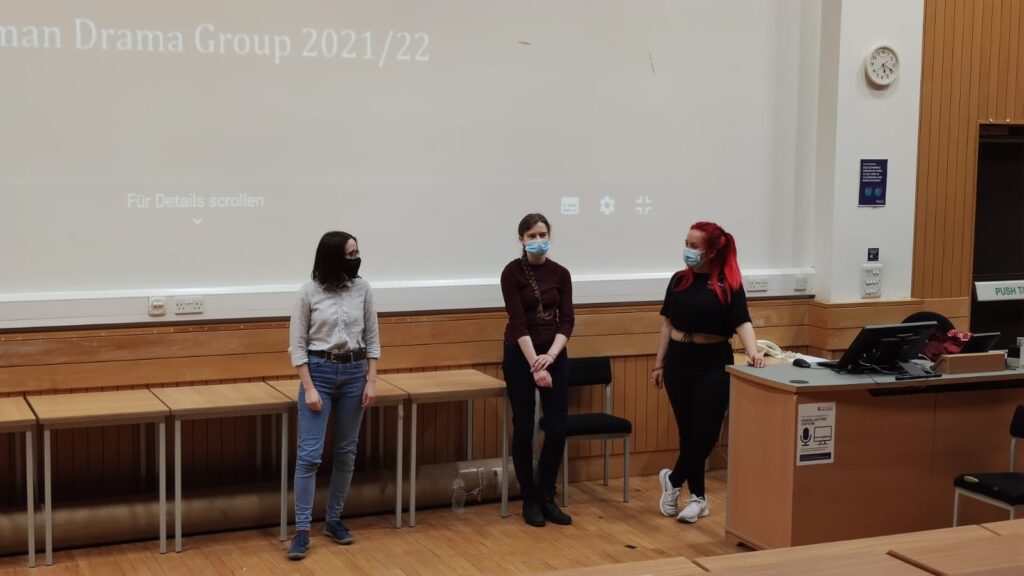
WOHNEN. UNTER GLAS - nach Ewald Palmetshofer, March 2021
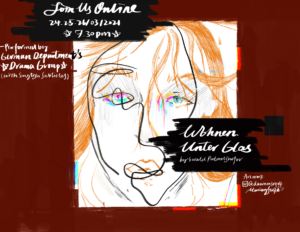
Performances
24/25/26 March 2021 via Live Stream
The audience is shown a digital artwork of an intersection. It’s a metaphor for the possibilities of life. A man’s voice off camera describes the pressure he faces due to societal expectations. Individuals were expected to have a vision, a perspective, the voice explains. Amidst a “panorama of vision perspectives”, the voice concludes, “you invent some perspective vision shit” yourself. The adaption of Ewald Palmesthofer’s play Wohnen. Unter Glas, premiered 2008 at Schauspielhaus Vienna, addresses life’s invisible obstacles which prevent progress. From 24th to 26th March, the play is performed in German by the German Department’s drama group at the University of Aberdeen.
Under the direction of Lea Steinebrey the play tells the story of three former flatmates Jeani, Babsi and Max, (played by Alicja Grzelak, Lucy Stenhouse and Harrison Stuart) who meet again in their thirties. During their stay at a hotel they realize that they’ve changed and that their lives have taken different courses. While searching for similarities in their lives, they are confronted with personal failure and their lack of achievements. Animations by Dawn Liu frequently interrupt the main plot with the existential trains of thought the protagonists are experiencing. Narrated by Malwina Powala and Rossella Miccoli, the performance was recorded in advance and is presented to its audience digitally via YouTube.
The dialogue and syntax are mostly confusing. Sentences are unfinished, key words constantly repeated. Therefore, communication is distorted, and it often appears as if the characters are speaking in monologues rather than dialogues. However, “words are not the only medium”, states Rossella Miccoli. The atmosphere of ‘being lost’ is transported through isolation, too. The actors communicate with each other via zoom, which highlights that we are all “interacting through glass” at present and therefore, come across barriers. It’s just one of the glassy obstacles which affect communication within the play, and it creates a palpable atmosphere of helplessness and standstill. Swearwords put emphasis on what it means to be lost in a world fuelled by self-optimization. It is not a “classic theatre play”, highlights Malwina Powala. The play blends as much into life in the middle of a worldwide pandemic, as it reflects society’s capitalist ethos. It combines our present situation of stagnancy and routine with the overwhelming pressure to perform and to improve.
As a GET student, Lea Steinebrey holds on to an old tradition of theatre productions between GET students and students of the University of Aberdeen. According to the team, they had to step out of their comfort zone and “to adopt to what’s available” under currently complicated circumstances. “The group has never met in person and we were sitting in three different time zones”, explains Steinebrey. Nonetheless, they managed to get to know each other online. “I think the fascination for language was our biggest common interest”, she continues. During preparation time, the members of the group intensively talked about their native tongues and discussed “quirks of the German, English, Finnish and Polish language”. The audience was impressed by the performance and especially emphasized that the adaption captured a collective mood.
Testosteron, March 2020
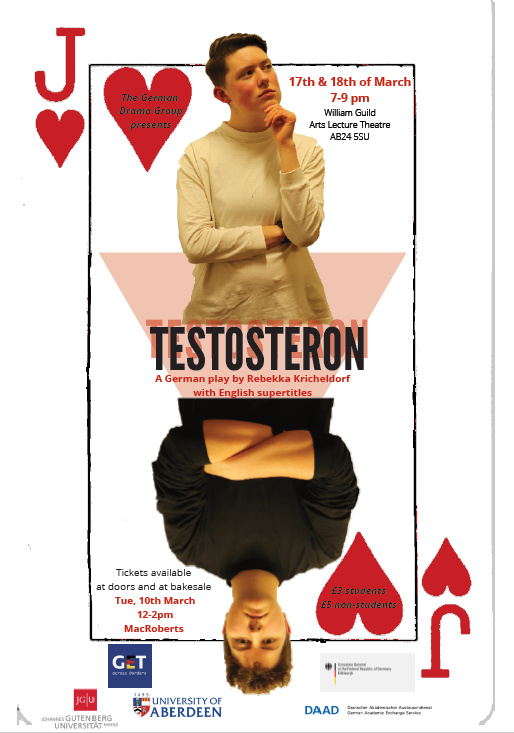
University of Aberdeen's German Drama Group Presents "Testosteron"
Performances
17th and 18th March 2020, 7 pm at the Arts Lecture Theatre
Frühlingserwachen - Spring Awakening, March 2019
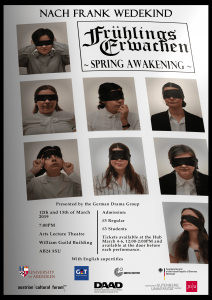
Performances
12th and 13th March 2019, 7 p.m. at the Arts Lecture Theatre
Frank Wedekind was a modern-period Swiss-German writer, dramatist and actor. His works act as social critiques dealing with subjects such as morality, sexuality and mental health. Amongst his most famous plays are Spring Awakening and Lulu. Frühlings Erwachen - Eine Kindertragödie was published in 1891, but due to its controversial themes only first performed in 1906. Dealing with themes of coming of age, academic pressure, and societal repression, the teenaged protagonists struggle with growing up in a world they don't understand. As the adults refuse to give them the tools they need to make good decisions, ignorance leads to tragedy.
Many thanks to our GET Calvin Hüttner for helping to make this production possible!
This year's production was kindly sponsored by GET across borders, the Johannes Gutenberg-University Mainz, the University of Aberdeen, the DAAD, the Goethe-Institut, the Austrian Cultural Forum, and the Consulate General of Germany in Edinburgh.
Thanks to everyone for this successful performance!
Hoppla, wir leben! - Nach Ernst Toller, March 2018
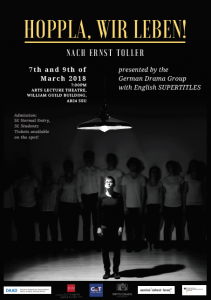
Performances
7th and 9th March 2019, 7 p.m. at the Arts Lecture Theatre
Ernst Toller was a German dramatist who contributed largely to the Weimarer Expressionism. Shortly after the First World War, he became known as an expressionist writer.
Many thanks to our GET Angelika Sumyk for helping to make this production possible!
This year's production was kindly sponsored by GET across borders, the Johannes Gutenberg-University Mainz, the University of Aberdeen, the DAAD, the Goethe-Institut, the Austrian Cultural Forum, and the Consulate General of Germany in Edinburgh.
Thanks to everyone for this successful performance!

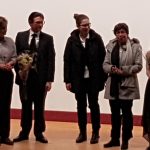
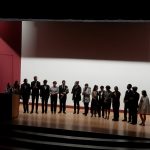
Mutter Courage und ihre Kinder - nach Berthold Brecht, March 2017
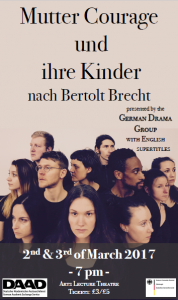
Performances
2nd and 3rd March 2017, 7 p.m. at the Arts Lecture Theatre
Many thanks to our GET Theresa Schmitt for helping to make this production possible!
This year's production was kindly sponsored by GET across borders, the Johannes Gutenberg-University Mainz, the University of Aberdeen, the DAAD, and the Consulate General of Germany in Edinburgh.
Thanks to everyone for this successful performance!
